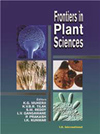投稿信息
稿件收录要求
Frontiers in Plant Science is a leading journal in its field, publishing rigorously peer-reviewed research that seeks to advance our understanding of fundamental processes in plant biology. Field Chief Editor Prof. Yunde Zhao at the University of California is supported by an outstanding Editorial Board of international researchers. This multidisciplinary open-access journal is at the forefront of disseminating and communicating scientific knowledge and impactful discoveries to researchers, academics, policy makers and the public worldwide.
In an ever-changing world, plant science is of the utmost importance for securing humankind's future well-being. Plants provide oxygen, food, feed, fibers, and building materials, and are a diverse source of industrial and pharmaceutical chemicals. In addition, they are centrally important to the health of ecosystems, and the management and maintenance of a sustainable biosphere necessitates their thorough understanding. A basic knowledge of plant biology processes underpins our ability to both utilize and improve plants for sustainable production of food, biofuel, and renewable biomaterials, as well as better understand their role in the environment.
Plant science is extremely interdisciplinary, reaching from crop molecular genetics, cell biology, and physiology to ecology, evolution and plant pathogens. It uses the latest developments in computer science, optics, molecular biology, biochemistry, and genomics to address challenges at the cellular level, within whole plants, and into ecosystems; it explores the form, function, metabolism, growth, development, diversity, reproduction, evolution, and their interactions with the environment and other organisms throughout the biosphere.
Frontiers in Plant Science welcomes original and significant contributions from across the field — from single-plant to populations and whole-ecosystem analyses; from molecular, to biophysical, to computational approaches; from molecular to the organism-scale studies.
Please consider the quality and content requirements for experimental studies as listed below
ii) Descriptive studies that define gene families using basic phylogenetics and the assignment of cursory functional attributions (e.g. expression profiles, hormone or metabolites levels, promoter analysis, informatic parameters).
i) Complementation via transformation is used for confirmation;
ii) The allele has been previously characterized and published and is representative of multiple independent lines;
iii) Systems where genetic transformation is difficult or not yet possible, alternative evidence should be presented supporting the reported allele.




